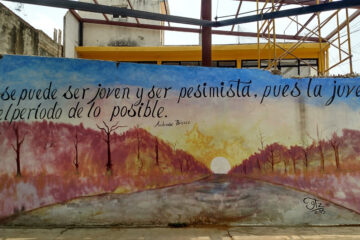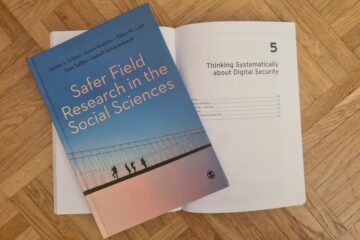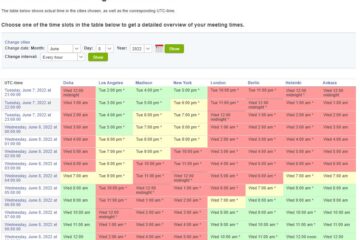by Jack Rechsteiner and Betsy Sneller, Michigan State University
Like many research programs that rely on ethnographic fieldwork, traditional sociolinguistic research relies heavily on researchers building rapport with participants by spending time in their communities and sitting down with them in person to audio-record informal conversations. The widespread social distancing measures imposed during the COVID-19 pandemic required a radical change in this methodology for many researchers, including the faculty, graduate students, and undergraduate students that comprise the Michigan State Sociolinguistics Lab. Simultaneously, the radical changes to people’s lives presented an important research question: How have those changes affected their language? The MI Diaries project was born out of this question. It was developed with the specific goal of establishing a digital speech archive that would represent the diverse experiences of a wide range of Michigan-based individuals – over the course of the pandemic and through the return to “normal”. MI Diaries began as a project run by the Sociolinguistics Lab, but the core team quickly grew to also include students from a wide range of disciplines such as computer science, experience architecture, and advertising. Welcoming a diverse range of new team members required us to develop ways to build a sense of community virtually with team members, and the nature of sociolinguistic work simultaneously required us to develop a sense of community through digital means with participants. In what follows, we highlight why developing a sense of community was crucial to the research, and some of the methods that we have employed.
Why digital community is important for the research
The social distancing restrictions imposed due to COVID-19 required MI Diaries to turn to digital data collection: Participants (“diarists”) are asked to self-record audio “diaries” using the MI Diaries app, which is available for iOS and Android. This had the added benefit of enabling us to collect data from a large number of diarists over a wide geographic range. However, in order to be able to analyze language changes driven by the pandemic, the use of digital data collection techniques raised two related challenges for us: (1) We needed diarists to feel comfortable and speak in an informal conversational style, and (2) We needed to retain diarists over the course of our longitudinal project. During COVID-19, we were faced with the question of “how can we obtain informal, conversational-style data from speakers in a digital space?”
With in-person techniques unavailable to us, MI Diaries focused instead on building rapport with remote participants by putting community and trustworthiness at the heart of everything that we do in this project. This focus was refined and expressed in the mission, vision, and values of MI Diaries. Building rapport through a sense of broader community was, in some ways, a natural desire for both team members and many diarists. For the past year, many of us have been living in social isolation through “unprecedented and uncertain times” (LSSU 2021), and have been regularly reminded that “we’re in this together” – a phrase that highlights the need for and the difficulty of creating community during a global pandemic. Building community digitally, however, was a challenge that members of the MI Diaries team had not faced before. While we knew who diarists were, they did not know us. Most audio diary entries address us as “MI Diaries”, an amorphous and anonymous group. Diarists also have no way of getting to know each other, as our project requires us to maintain diarist confidentiality and not share any identifying information. In the face of these obstacles, we’ve been able to intentionally utilize digital spaces and methods to build a sense of community with diarists and with our research team.

Dr. Sneller leads a MI Diaries team meeting online. One team member introduced her new hamster, Vinny, to the rest of the team – prompting some great question prompts about pets
Building community within the team
While our primary goal is to build a sense of community amongst participants, we discovered very early that this goal was best served by also building a sense of community amongst members of the research team. Most members are MSU students and initially many were lab members who knew each other, but some are students at other colleges, and our youth interns are in middle and high school.
In many ways, the research goals of the project caused a sense of community to naturally emerge amongst team members. For example, one early approach to building project trustworthiness for participants also facilitated team members learning about each other. We created a “Meet the Team” page on our website, which includes photos and snippets of audio diaries from each team member. Our primary reason for sharing team member photos and stories was to encourage diarists feel comfortable talking to us, and therefore more likely to speak informally and conversationally. But it also had the added benefit of allowing team members to get to know each other better as well. Developing the project’s mission, vision, and values statements also gave team members a shared sense of purpose (in the mission), as well as guiding values that gave clarity in decision making. The mission and values statements are provided below:
MI Diaries Mission and Values statements
In our weekly meetings, we spend half an hour in small groups developing fresh and interesting diary prompts to be sent out via email (like “Have you ever had a family member style or cut your hair poorly? What happened?” and “What are you grateful for this week?”). The primary goal of these small group meetings is to develop questions for diarists to answer, but often the questions are formed from recent personal experiences that team members discuss which also serves to build community amongst our team.
Along with the community building that developed as an effect of the weekly work, we’ve also added a “Team member updates” section to the beginning of every meeting, where team members can share any good news – big or small – that we can celebrate together. Once a week, our project social media accounts share a small blurb about things that team members are celebrating. The intra-team coalition building that has developed out of all of this extends beyond the weekly virtual team meetings as well: as one of our graduating undergraduate RAs put it, “Being part of the MI Diaries project has given me the opportunity to truly feel like I have a place at MSU and to build relationships with like-minded people in a year where that type of connection has been hard to find” (MSU, 2021). We believe that the sense of community built up amongst the research team has in turn fostered a sense of community amongst diarists as well. These two forms of community necessarily feed into each other, and it would be difficult to have one without the other.
Building community for diarists
From this community of research team members, MI Diaries sought ways to best create rapport and trust with diarists. Some of these approaches were highlighted above: for instance, we share team member audio diaries on our website, which helps highlight our project values of trustworthiness and authenticity. We also have, from the very beginning, selected a handful of stories each week (from diarists who have agreed to have their anonymized stories shared online), so that diarists can hear submissions from other diarists. In our weekly emails, we highlight these selected stories and link to them; diarists regularly respond to these stories in their submissions. These stories are maintained in our online archive, so that diarists can listen back and get a broader sense of the kinds of experiences that fellow Michiganders have been going through.
MI Diaries has also created social media pages (Facebook, Twitter, and Instagram) where we routinely post content that allows diarists and non-diarists alike to become familiar with the project and the team. Social media also allows visitors to engage with our project in a more interactive way. This includes our selected stories for each week, but also includes team member congratulations posts and updates about any press coverage or research presentations on the project. These posts all follow our values of trustworthiness and authenticity, while aiming to engender an understanding of the project and a sense of openness about the project and the community it has created. We are gratified to hear from diarists that MI Diaries has become a new community for them, as highlighted by one of our featured diary entries from March 2021:
MULTIMEDIA COMPONENT ALT TEXT: A diary which was selected to be featured for the week of March 21, 2021, talks about how being a part of MI Diaries has provided them with an unexpected feeling of community in the past year.
TRANSCRIPT: Have you found or created any unexpected community or connections in the past year? I think Michigan Diaries is probably it, right? You know, why did I start participating? I was living in a hotel, you know just looking for a way to express myself, thought it was cool to contribute to science. I kind of found a little community it’s kind of cool. Also the sea shanties a little bit, I haven’t like talked to anyone except Michigan Diaries about that but and family a little bit but they’re kind of like, oh cool. That’s kind of just, kinda of weird to be part of an anonymous community online.
Upholding trustworthiness and a sense of community can be a vital aspect of digital fieldwork that actively works with research participants. These tenets are valuable to researchers doing any sort of ethnographic or socially involved research; even though digital fieldwork may be done remotely, it is still possible to build rapport through intentional and thoughtful digital work. Being part of a community and the sense of belonging which comes with it are central human needs, and taking steps to allow people to find community through their participation in research will not only be enriching for the results, but for everyone involved in the research.
References
Lake Superior State University. (2021, February 24). Banished Words List. Lake Superior State University. https://www.lssu.edu/traditions/banishedwords/.
Michigan State University. (2021, May 10). MI Diaries Project Sees Seven Team Members Graduate. College of Arts & Letters. https://cal.msu.edu/news/mi-diaries-project-sees-seven-team-members-graduate/.


